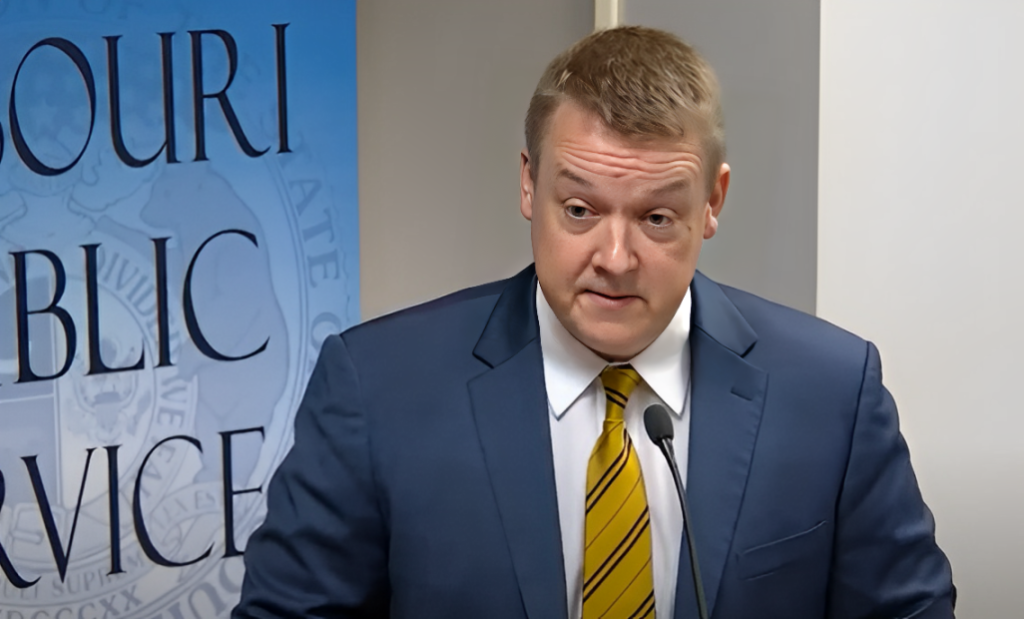Missouri was on the verge of getting crucial data on utility shutoffs, but a last-minute move by a state regulator stopped it from happening. The person responsible, Kayla Hahn, was a key official at the Missouri Public Service Commission (PSC), which oversees private utility companies. Consumer advocates believe her decision to block transparency is part of a larger shift toward favoring utility companies under her leadership.
The PSC is responsible for setting utility rates and making rules that affect companies and consumers across the state. One of these rules, which was nearly finalized after years of discussion, would have required companies to report disconnections by ZIP code. This would have allowed the public and advocacy groups to see which areas faced the most shutoffs. Consumer groups supported the measure, and even commissioners discussed its value in meetings. However, in the final moments of deliberation, the ZIP code requirement was removed.
The nonprofit watchdog group Energy and Policy Institute uncovered the reason behind the sudden change. Public records revealed that Hahn, a recent PSC appointee at the time, contacted her former colleagues in Missouri Governor Mike Parson’s office, where she previously worked as a senior adviser. She asked them to reject the rule, and they complied.
By making this back-channel request, Hahn ensured that neither her fellow commissioners nor consumer advocates were aware of her role in blocking the requirement. Without ZIP code-level reporting, the public remains unaware of the specific areas most affected by utility disconnections. Data consistently shows that shutoffs disproportionately impact communities of color, and removing this transparency makes it harder to direct assistance to those who need it most.
The Missouri Public Service Commission has refused multiple requests to comment on Hahn’s involvement or her communications with the governor’s office.
Hahn’s effort to stop ZIP code-level shutoff reporting began with an email to the governor’s office on August 18, 2023. She urged officials to reject the final version of the PSC’s Residential Disconnection Rule. In an attached document, she argued that the ZIP code reporting requirement would create unnecessary regulatory burdens and increase costs for utility companies, which could then be passed on to customers. Three weeks later, the governor’s office responded, agreeing to block the rule.
Following the governor’s opposition, the PSC quickly removed the ZIP code requirement from the final rule. In a public meeting on September 7, 2023, a regulatory law judge confirmed that the only major change between the governor’s initial approval of the rule and its later rejection was the addition of ZIP code reporting. With the governor’s stance made clear, commissioners decided to drop the measure.
Even though some commissioners acknowledged the usefulness of ZIP code-level data, they felt there was no point in risking the entire rule by insisting on its inclusion. Hahn, however, never disclosed that the governor’s rejection was due to her own request.
Utility regulators like the PSC have a unique role that combines judicial and legislative powers. While commissioners must remain neutral when making individual rate decisions, they have more flexibility when creating rules that affect all utilities. In this case, Hahn used her position to influence the decision without public discussion.
The PSC has defended Hahn’s communication with the governor’s office, stating that she was simply providing advice. However, legal experts and consumer advocates believe that while her actions may not have broken any rules, they were highly unusual. Utility attorney John Coffman, who works with the Consumers Council of Missouri, expressed surprise at the situation and wished there had been more transparency. Other advocacy groups, including the Sierra Club’s Beyond Coal campaign, also found it troubling that key decisions were being made behind closed doors.

Consumer groups were less concerned with Hahn’s opposition to the ZIP code requirement itself and more with the secretive manner in which she got it removed. A draft version of the rule, written just weeks before the governor’s office rejected it, showed that commissioners originally supported ZIP code reporting. That language was later erased after Hahn’s intervention.
Blocking this data keeps the public from knowing how widespread disconnections are in Missouri. Utility companies argue that reporting shutoffs at the ZIP code level would be costly and difficult, and Hahn agreed. In her message to the governor’s office, she claimed that collecting and processing this data would create expenses for both the commission and private utility companies.
However, an official fiscal analysis of the rule showed that the commission would need to hire an additional employee regardless of whether ZIP code-level reporting was included. The estimated cost to each utility company ranged from $8,000 to $15,000 per year. While utilities argued that requiring ZIP code data could increase costs further, they did not provide specific estimates.
Despite their objections, consumer advocates argue that utilities already have access to this information. Companies need customer ZIP codes for billing, meaning they could easily report shutoffs by location. Many states, including Illinois, California, Minnesota, and New Jersey, already require ZIP code-level reporting for shutoffs.
Missouri’s Office of the Public Counsel, which represents consumers in utility matters, stated that the cost of collecting this data would be outweighed by the benefits. More detailed information could even help Missouri qualify for federal assistance to prevent shutoffs.
Missouri has some of the highest utility shutoff rates in the country. In 2022, the state ranked sixth in total disconnections, despite being the 18th largest state by population. Between March and November 2024, Missouri’s largest gas and electric providers, Spire and Evergy, reported nearly 50,000 shutoffs in the Kansas City area alone. While a single shutoff is counted only once, some households may have faced multiple disconnections in that period.
Available data consistently shows that utility shutoffs disproportionately affect people of color. A 2020 study found that Black households receiving water shutoff warnings were twice as likely as white households to have their water disconnected.
Similarly, a 2022 survey found that Hispanic residents were over 80% more likely to face energy shutoffs than white residents. A 2024 study on Minnesota’s largest utility found that customers of color were three times as likely to be disconnected as white customers, even when income and homeownership were considered.
Keeping shutoff data hidden may also help companies avoid public scrutiny. Consumer advocates suspect that utilities prefer to keep this information private so the public remains unaware of the extent of disconnections. If ZIP code-level data were available, it could highlight patterns of disconnection and push utilities to improve service and assistance programs.
Hahn’s actions reflect a broader shift in the Missouri PSC under her leadership. Advocacy groups believe the commission is becoming increasingly aligned with utility companies’ interests. Legal experts note that the PSC typically stays neutral on legislative matters, but Hahn appears to be taking a more proactive, pro-utility stance. She has also been involved in other policy decisions that benefit utility companies, including changing the default electricity rate plan for Evergy customers.
Her personal ties to the industry have also raised concerns. Her husband, a lobbyist, previously worked for Missouri American Water, a major private utility in the state. While there is no direct evidence linking him to her policy decisions, consumer advocates worry about the influence of corporate interests in the PSC.
As the PSC continues to shape Missouri’s utility policies, consumer groups fear that decisions favoring business interests will make it harder for customers to access affordable services. Without detailed reporting, community organizations will struggle to help those most affected by shutoffs. Transparency advocates say the public deserves to know where disconnections are happening and why.
Disclaimer: This article has been meticulously fact-checked by our team to ensure accuracy and uphold transparency. We strive to deliver trustworthy and dependable content to our readers.

